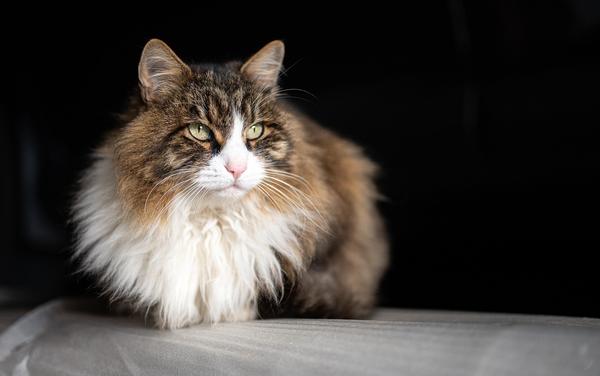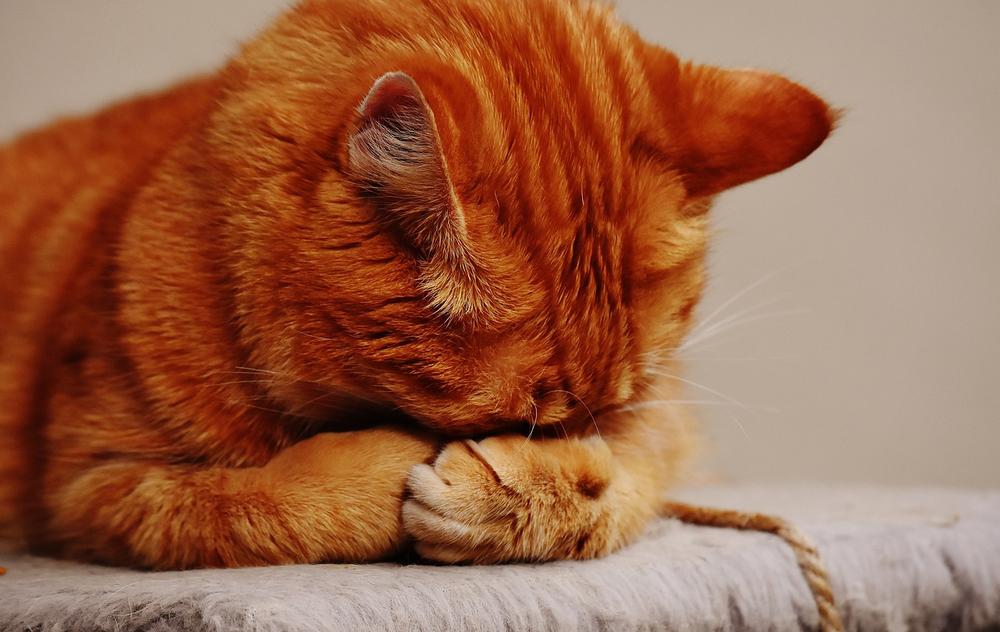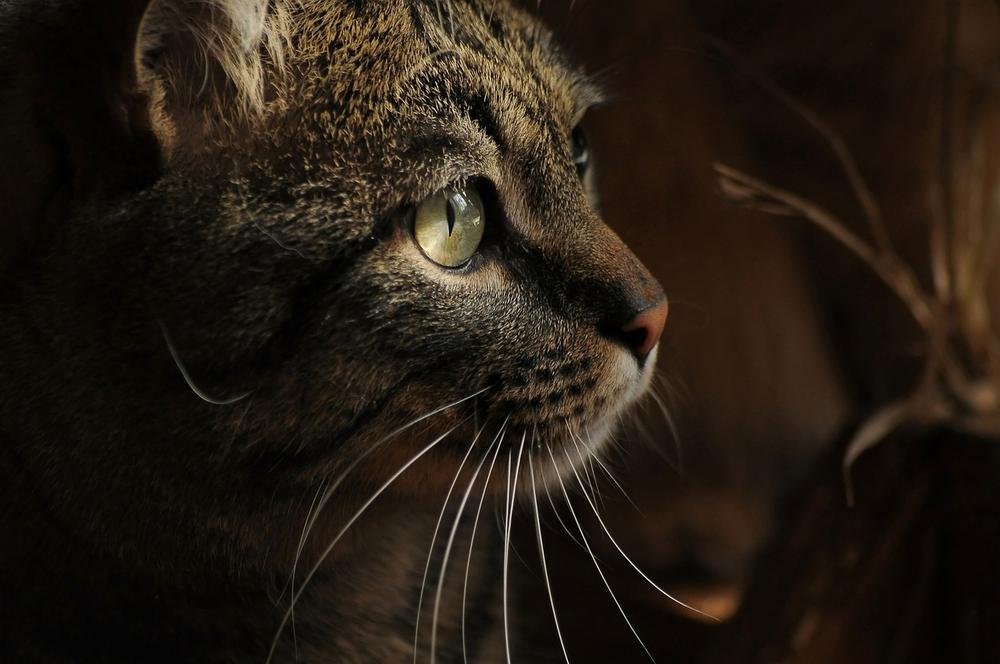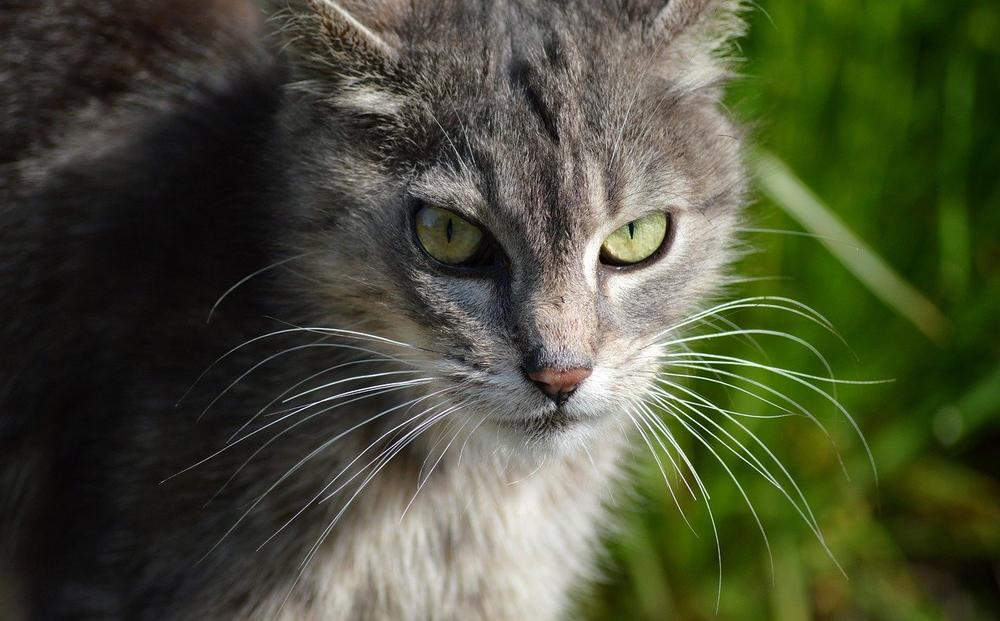White Cat Poop: Is It Normal? Should You Worry? What to Do?

Ever wondered why your cat's poop is white?
Worried about what it means for their health?
I understand.
Your mind probably goes into overdrive, imagining all the worst-case scenarios. 😟
Is it a sign of some serious illness?
Or maybe it's just a harmless quirk?
Well, don't fret.
Let's delve into the mystery of white cat poop together and find out the truth.
Ready to put your worries to rest?
Let's begin.
Is White Cat Poop Normal?
White cat poop is not normal and could indicate an underlying issue. It may be caused by certain medications or supplements. Abnormal signs like frequent or difficult bowel movements, along with colors like red, black, green, yellow, or white, should be investigated. Consult a vet if you notice this unusual color.
Don't jump to conclusions, but white cat poop is definitely worth looking into. Let's go through what could be causing this unusual color and if it's something to worry about.
Normally, cat poop is a nice brown color thanks to bile pigments. White?
Not so much.
So, if your kitty's poop is white, there could be an underlying issue that needs attention.
One possible reason for this odd color is certain medications or supplements they've taken.
Some remedies have ingredients like bismuth subsalicylate or kaolin that can change the color of your cat's poop.
Take a moment to see if your cat has been given anything new lately.
That might explain things.
Now, light brown poop is fine as long as it's consistently that way every day. But if you notice any abnormal signs like frequent or difficult bowel movements, along with colors like red, black, green, yellow, or white, it could mean something else is going on.

Pay attention to clay-colored or pale yellow poop too. Those variations are worth investigating.
A little mucus in cat poop is normal and helps with smooth movement.
But if there's an excessive or oddly colored amount, it might indicate a problem.
Healthy cat poop should be a consistent brown color. Keep that in mind when checking out their litter box.
Speaking of which, finding white poop in there doesn't mean your cat is getting older.
It just means the poop was originally white.
Don't ignore white cat poop.
If you spot this unusual color, it could be a warning sign that your cat's health needs attention.
So don't hesitate to talk to your vet about it.
Main points I'll expand upon further down this article:
- White cat poop can indicate health issues such as fungal toxicosis, parasites, or infectious bowel disease.
- Changes in energy, appetite, stool consistency, or yellow discoloration should be taken seriously.
- White mold in cat poop is a sign of fungal toxicosis and requires veterinary treatment.
- Tapeworms and other intestinal parasites can cause white specks in cat poop.
- Liver issues or the presence of round or tapeworms can lead to white cat poop.
- Mucus in cat poop is normal, but excessive mucus may indicate a problem.
- Runny or extremely hard stools may signify dehydration or other health issues.
- Mold can grow on cat poop if it is not cleaned regularly, posing hazards.
- Any significant change in poop color should be addressed with a vet.
- Veterinary care is necessary to diagnose and treat any changes in poop color.
But what if it's not just medication or supplements causing your cat's white poop?
There could be a more serious underlying issue at play.
Let me tell you about some of the potential culprits and why seeking veterinary attention is crucial for your furry companion's health...
Is White Cat Poop a Sign of Illness?
If your cat is pooping white, it ain't good news. 😿
It means something's up with your furry buddy.
So what could be causing this strange sight?
Well, one possibility is a condition called inflammatory bowel disease (IBD).
With IBD, the immune system goes haywire and starts attacking the digestive tract. This leads to inflammation and other not-so-great symptoms.
If your cat's poo is white and they're also dealing with issues like diarrhea, vomiting, weight loss, or a loss of appetite, it might be a sign of IBD.
But IBD isn't the only culprit. White poop can also indicate fungal toxicosis, internal parasites, or infectious bowel diseases. These troublemakers come with their own set of symptoms, like changes in energy levels, appetite swings, poop consistency changes, and yellow coloring.

If you notice any lasting changes in your cat's poop color, constipation, diarrhea, vomiting, or food aversion, you gotta get them to a vet.
A professional can figure out what's going on and make a plan for treatment.
White mold in cat poop could mean fungal toxicosis, which definitely needs a vet's attention.
So don't brush off these symptoms.
Take 'em seriously and get your feline pal the care they deserve.
If you notice any lasting changes in your cat's poop color, constipation, diarrhea, vomiting, or food aversion, you gotta get them to a vet.
A professional can figure out what's going on and make a plan for treatment.
But if you're also worried about why your cat is losing whiskers on one side, I highly recommend checking out my blog post, Why Is My Cat Losing Whiskers on One Side.
It's filled with invaluable information that will help you understand the possible reasons behind this peculiar behavior.
Is White Cat Poop a Sign of Parasites?
One potential cause of white cat poop is the presence of tapeworms in the intestines.
Look for additional signs of tapeworm infection, such as ricelike segments around your cat's anus or excessive grooming of the anal area.
Tapeworm infection is usually caused by consuming an infected flea but can be treated with dewormers prescribed by a veterinarian.
To prevent tapeworm infections, flea prevention is necessary.
Small white patches or flecks in fresh cat feces may indicate the presence of intestinal worms, such as tapeworms if they resemble rice-like parts or roundworms if they resemble thin spaghetti-like parts.

Other intestinal parasites like roundworms and hookworms can also cause white spots or specks in the stool.
Regular deworming treatments prescribed by a veterinarian are recommended to prevent and treat common parasites like tapeworms and coccidia, leading to improved cat health.
Diagnostic tests for fungal toxicosis involve imaging techniques or examining mold/fungi growth to identify fungal toxins in the body.
Well, there you have it.
Many possible causes of white cat poop, but definitely something to keep an eye on and address with your vet if you notice any changes in your fluffy friend's business. 😺
But what if your cat's poop is not just white, but also pale or clay-like?
Well, let me tell you, there could be a deeper reason behind it:
Is White Cat Poop a Sign of Liver Disease?
Pale white poop in cats can be a sign of liver disease, my friend.
Now, you might be wondering why cat poop color matters to you.
I totally understand your concern.
So, here's the deal.
When your cat's poop is white and looks all pale like clay, it could mean trouble in paradise.
Liver disease, or a blockage in the bile duct that hinders the flow of bile into the digestive system, can cause this peculiar color. And let me tell you, bile is one important player in the digestion game.
Bile acts as a superhero, helping with the absorption of fats in your cat's diet.
But when it can't find its way through the digestive system, cat poop turns white, my friend.
Not a good sign.
So, if you notice white poop in your cat's litter box, keep your eyes peeled for other concerning symptoms too.
One possible accompanying symptom of liver disease is jaundice.
It's when your cat's skin and eyes turn yellow, giving them a unique glow. It’s like they’re auditioning for a new superhero movie. However, your cat isn’t feeling so super.
Another red flag is when your cat loses their appetite.
Seriously, if fluffy starts turning up their nose at dinner time and that white poop shows up, it's time to take action.
Orange poop can also point to issues with the liver or gallbladder, my friend.
If your cat's poop leans more towards a pale brownish-orange shade, there might be a problem with the bile duct or even liver dysfunction.
With all that being said, if you spot white, clay-like, or pale stool in your cat's litter box, set an appointment with a veterinarian ASAP.
They’ll give your furry friend the proper diagnosis and treatment they need.
Significance of White Cat Poop as an Indicator of Malabsorption
White cat poop can indicate malabsorption, along with weight loss, diarrhea, and increased appetite. Excessive mucus in the stool may also be a warning sign. If your cat exhibits these symptoms, consult a vet for guidance on dietary changes or further tests. Stay vigilant, cat lovers!
White cat poop can be a sign of malabsorption, my friend, and I want to explain why.
You see, when your cat's body struggles to break down and absorb nutrients from food, their stool may turn white and chalky.
It's definitely not normal, so pay close attention.
But wait, there's more. There are other signs you should look out for too.
Weight loss, diarrhea (yes, nobody likes that), and an increased appetite can also be red flags.
Now, let me tell you something interesting.
A little bit of mucus in cat poop is actually quite normal.
It helps things move smoothly through the intestines - how efficient.
However, if there's an excessive amount of mucus in the mix, that could indicate something isn't quite right. Trust your instincts on this one.
So, if your cat has white cat poop accompanied by these telltale symptoms, don't hesitate to contact your vet pronto.
They're the experts and will guide you on the next steps to take, whether it's advising dietary changes or running further tests.
Stay vigilant, cat lovers!
Well, now that you understand why white cat poop could be a sign of malabsorption, let's dive into another intriguing possibility - dehydration. Did you know that the color and consistency of your cat's stool can hold valuable clues about their overall health?
Let me tell you more:
Is White Cat Poop a Sign of Dehydration?
If you find white poop in your cat's litter box, it could mean your furball is dehydrated.
Keep an eye on your cat's water intake...
Dehydration isn't the only reason for white poop though. Constipation or liver issues can also cause pale stools.
Time to play detective and investigate poop (how glamorous!).
Ensure your cat has access to fresh water throughout the day.
Pay attention to changes in poop consistency.
Liquidy pudding or rock-like stools may indicate dehydration or health problems.
Yes, poop holds the key to feline health mysteries, like Morse code.
Watch for color or texture changes.
Small adjustments in poop provide valuable insights into your cat's wellbeing.
And lest we forget, water is essential for good cat health, so get that water bowl and let your cat hydrate like a boss!
Can Diet Cause White Cat Poop?
Yes, a cat's diet can be a cause of white poop. Changing to a raw diet or consuming excessive grass can result in paler stool. Lack of beneficial gut flora or liver/gallbladder problems may also lead to white poop. Consult a vet for proper guidance.
If your cat's poop is white, you might be wondering if it's something to worry about.
Let's dive into the topic and see what could be causing this unusual color.
Yes, diet can indeed play a role in your cat's poop color.
So if you've made a change, especially to a raw diet, don't be surprised if you start seeing paler, chalky poop.
But hey, make sure to follow your vet's guidance during the transition to avoid any imbalances.
Excessive grass consumption and overgrooming due to allergies or stress can mess with your cat's stomach and lead to clumps of hair in their poop.
And that can give it a white color.
Oh, and here's an interesting fact:
If your cat's poop has been left out for too long, it might come into contact with moisture and grow mold.
That can turn it white.
Consistently white poop could mean your cat lacks beneficial gut flora.
In that case, take 'em to the vet because probiotics might be recommended as part of the treatment plan.
Now, improper feeding of a raw diet can also cause white poop.
It might even be a sign of liver or gallbladder problems. So again, listen to your vet when preparing homemade meals.
Gray poop is another concerning color that could signal a dietary problem or an imbalance in healthy gut bacteria.
If you notice gray poop, visit the vet and make adjustments to the diet.
Switching food or consuming more dairy products can also lead to light-colored stool in cats.
Some other foods, treats, medications, starches, fiber, antacids, anti-inflammatory drugs, and antibiotics can mess with the color too.
And finally, a low-fat diet can cause white or light-colored poop with loose, watery stools.
Not good for nutrient absorption and digestion.
When in doubt or concerned about your cat's poop color, always consult with your vet for professional advice.
How to Prevent White Cat Poop
To ensure a safe environment for both you and your furry companion, it is imperative that you clean the litter box diligently. Neglecting this duty can lead to the growth of mold, a dangerous menace not only for cats but also for humans.
By consistently keeping the litter box clean, you effectively curtail the chances of mold formation on your cat's waste.
Take charge of cleanliness and protect your loved ones from any potential harm lurking in the corners of the litter box. Remember, a pristine litter box is essential to safeguard their health and well-being.
Is White Cat Poop Dangerous?
Is White Cat Poop Dangerous?
Let's talk about it.
Here's the deal:
- White mold found on cat poop can be a potential health risk for both cats and humans.
- It may contain fungal toxins that you don't want to mess with.
So, keep yourself safe by handling and disposing of any moldy cat poop while wearing protective gloves, OK?
Regularly cleaning the litter box is absolutely crucial.
Why?
Because mold on cat poop can pose hazards to both humans and cats.
And trust me, you don't want that.
If you notice any significant change in your cat's poop color that lasts more than one or two stools, take it seriously.
You need to address it with a vet immediately.
Pay attention to symptoms like lethargy, lack of appetite, vomiting, or pale poop. These could be signs of a bile duct blockage that requires emergency attention.
White poop can also be caused by fungal toxicosis, which damages organs.
In that case, immediate veterinary care is necessary.
Don't wait, my friend!
And hey, do yourself a favor:
Regularly clean old cat poop.
If you leave it lying around, it can turn grey and moldy, becoming a whole new hazard.
White liquid poop?
Yikes! 😱
That's severe diarrhea and needs your vet's immediate attention.
Black or red feces?
Not good.
It might be a sign of bleeding in your cat's digestive tract.
Take it seriously and get them the help they need before things get worse.
Other abnormal stool colors or consistencies are also of medium concern. Play it safe and visit your vet to address any underlying medical issues.
If you suspect your cat has ingested toxins or foreign objects, don't waste time.
Seek veterinary care immediately.
Sometimes, white poop can even indicate a serious medical condition called bowel obstruction.
So, when in doubt, always seek immediate veterinary care.
Keep an eye out for any changes in your cat's poop color and don't hesitate to seek professional assistance if needed.
Your furry friend's health is worth it!
What to Do if Your Cat's Poop is White
Monitor your cat's progress after treatment
So, you took your kitty to the vet and they found out why your feline friend is leaving white gifts in the litter box.
Now you know what’s up.
But here's the deal:
During your furry companion's recovery process, it's crucial that you keep a close eye on their poop color.
As they heal, things should start going back to normal down there.
If you notice any changes in your cat's feces (like the persistent presence of white poop), or if things don't seem to be improving, don't ignore it and hope for the best.
Take them back to the vet pronto. Your cat’s health is at stake, and we want to nip any issues in the bud.
Taking your cat to the vet is key
I get you.
Visiting the vet can stress you out as much as your cat.
But believe me when I say it's absolutely necessary.
Taking your precious furball to the vet is the most reliable way to uncover any underlying illnesses or parasites that might be causing these abnormal poop colors. The vet can run tests, make a proper diagnosis, and recommend the right treatment.
Don't play doctor and Google your cat's symptoms, alright?
Unless you're a certified cat expert (and hey, maybe you are), let the professionals handle this one.
Follow the vet's instructions for recovery
Once you've been to the vet and received an official diagnosis, you need to follow their directions to a T for treatment and recovery.
This could mean giving your cat medication, providing well-balanced meals, making sure they always have fresh water available, and showing them lots of love and support throughout the healing process.
Giving your furry friend the proper care they need is vital to fully overcoming whatever is causing the white poop situation.
Show them some tender loving care (TLC) and assure them they're not alone on this enchanting journey of poop color transformation.
And that wraps up today's article.
If you wish to read more of my useful articles, I recommend you check out some of these: My Cat Has Worms How Do I Clean My House, Is Orange Essential Oil Safe for Cats, Cat Scratched My Eye, Are Stink Bugs Poisonous to Cats, and Do Cats Need Winter Clothing
Talk soon,
-Sarah Davis